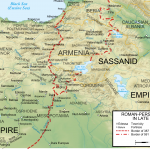I received word from Amazon that the newest version of my FREE educational Alexa skill, “Caesar’s Ancient World” has been certified. This latest version of the skill includes 280 images of ancient art from almost 100 institutions worldwide for those of you with Alexa-enabled devices with displays like the Echo Show, Echo Spot and FireTV. Of course the voice-only version remains available for those with regular Echos or Echo Dots.
I have redesigned the interface so you can now just ask Caesar what you would like to talk about and he will reply with narrative including sound effects. You can say things like “I want to know more about chariot racing” or “Tell me more about your greatest victory” or “I’m interested in gladiators”. If you can’t think of anything just say “I don’t know” or “I can’t think of anything” and he’ll suggest a topic!
Caesar is now capable of discussing fifty different topics…
This reminds me of the wonderful science fiction story “Gus” by Jack McDevitt. Not that I think that this imitation of Caesar is likely to develop something that might be, or even could be mistaken for, sentience or self-awareness. But back when McDevitt wrote “Gus” about an AI that imitates Augustine to help seminary students learn, that in itself was science fiction. Now it is basically something that we can do.
Would you introduce a virtual assistant into your classroom, regardless of whether or not it could pretend to be a historical figure from ancient times relevant to your class? Would you send students to interact with something like this on their own time, whether through Alexa, a phone app, or something web-based? What are advantages and disadvantages of such technology – not that we really have enough information yet to tell?
You can read an earlier post about the project here.
Of related interest from among my past posts here on the blog:
See also:
https://www.thetechedvocate.org/how-a-chatbot-can-help-your-school-or-university/
https://www.thetechedvocate.org/using-holograms-as-classroom-teachers-science-fiction-or-reality/
Inside Higher Ed had articles on not banning laptops from classrooms and tech career training.
Five Ways AI Is Not Like the Manhattan Project (and One Way It Is)
https://relcfp.tumblr.com/post/186651816222/ppai-isda-2019-special-track-philosophical
Will artificial intelligences be credited as inventors?
http://learningaloud.com/blog/2019/07/11/bored-left-behind-or-personalized/
https://www.thetechedvocate.org/how-schools-can-fight-cheating-with-artificial-intelligence/
https://www.thetechedvocate.org/can-machine-learning-decode-depression-in-students/
The NHS is setting up an AI medical lab
3D modelling and deep learning
Will DeepMind’s medical AI save lives?
There is also some fascinating technology using sound to analyze classroom participation and other aspects of class time usage. Take a look at the DART application (Decibel Analysis for Research in Teaching), which was the focus of a PNAS article in 2017.
https://www.sfsusepal.org/research/current-projects/dart-decibel-analysis-for-research-in-teaching/?cid=nwsltrtn













